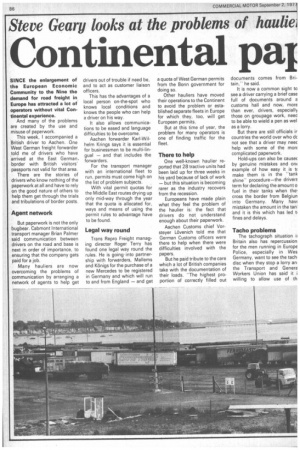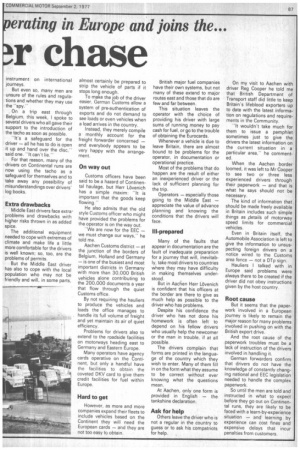Continental pm r chase
Page 88

Page 89

If you've noticed an error in this article please click here to report it so we can fix it.
SINCE the enlargement of the European Economic Community to the Nine the demand for road freight in Europe has attracted a lot of operators without vital Continental experience.
And many of the problems are created by the use and misuse of paperwork.
This week, I accompanied a British driver to Aachen. One West German freight forwarder ,told me of drivers who have arrived at the East German. border with British visitors' passports not valid for that area.
There are the stories of drivers who know nothing of the paperwork at all and have to rely on the good nature of others to help them get through the trials and tribulations of border posts.
Agent network
But paperwork is not the only bugbear. Cabmont International transport manager Brian Palmer said communication between drivers on the road and base is next in order of importance, to ensuring that the company gets paid for a job.
Many hauliers are now overcoming the problems of communication by arranging a network of agents to help get drivers out of trouble if need be, and to act as customer liaison officers.
This has the advantages of a local person on-the-spot who knows local conditions and knows the people who can help a driver on his way.
It also allows communications to be eased and language difficulties to be overcome. Aachen forwarder Karl-Wilhelm Krings says it is essential for businessmen to be multi-lingual — and that includes the forwarders.
For the transport manager with an international fleet to run, permits must come high on the list of problem subjects.
With vital permit quotas for the Middle East routes drying up only mid-way through the year that the quota is allocated for, ways and means of using the permit rules to advantage have to be found.
Legal way round
Trans Repro Freight managing director Roger Terry has found one legal way round the rules. He is going into partnership with forwarders, Mallems and Konigs for the purchase of a new Mercedes to be registered in Germany and which will run to and from England — and get a quota of West German permits from the Bonn government for doing so.
Other hauliers have moved their operations to the Continent to avoid the problem or established separate fleets in Europe for which they, too, will get European permits.
But at this time of year, the problem for many operators is one of finding traffic for the fleet.
There to help
One well-known haulier reported that 28 tractive units had been laid up for three weeks in his yard because of lack of work — but this situation is becoming rarer as the industry recovers from the recession.
Europeans have made plain what they feel the problem of the haulier is: the fact that drivers do not understand enough about their paperwork.
Aachen Customs chief Vorsteyer Lovenich told me that German Customs officers were there to help when there were difficulties involved with the papers.
But he paid tribute to the care which a lot of British companies take with the documentation of their loads. "The highest proportion of correctly filled out documents comes from Britain," he said.
It is now a common sight to see a driver carrying a brief case full of documents around a customs hall and now, more than ever, drivers, especially those on groupage work, neec to be able to wield a pen as wel as a lorry.
But there are still officials ir countries the world over who dc not see that a driver may neec help with some of the mor( complicated paperwork.
Hold-ups can also be causec by genuine mistakes and on example of how easy it is t( make them is in the "tank shine" procedure—the drivers term for declaring the amount o fuel in their tanks when the' cross the border from Belgiun into Germany. Many hay( mistaken the amount in the tan and it is this which has led t, fines and delays.
Tacho problems
The tachograph situation Britain also has repercussion for the men running in Europe Police, especially in Wes Germany, want to see the tach disc when they stop a lorry an the Transport and Genera Workers Union has said it i willing to allow use of th instrument on international journeys.
But even so, many men are unsure of the rules and regulations and whether they may use the "spy."
On a trip east through Belgium, this week, I spoke to several drivers who all gave their support to the introduction of the tacho as soon as possible.
"It's a safeguard for the driver — all he has to do is open it up and hand over the disc," said one. It can't lie.
For that reason, many of the drivers on Continental runs are now using the tacho as a safeguard for themselves and to take away any possibility of misunderstandings over drivers' log books.
Extra drawbacks
Middle East drivers face extra problems and drawbacks with higher risks thrown in as added spice.
The additional equipment needed to cope with extremes of climate and make life a little more comfortable for the drivers is well known; so, too, are the problems of permits.
But the Middle East driver has also to cope with the local population who may not be friendly and will, in some parts, almost certainly be prepared to strip the vehicle of parts if it stops long enough.
To make the job of the driver easier, German Customs allow a system of pre-authentication of exports and do not demand to see loads or even vehicles when a load arrives in the country.
Instead, they merely compile a monthly account for the freight forwarder concerned — and everybody appears to be very happy with the arrangement.
On way out
Customs officers have been said to be a hazard of Continental haulage, but Herr Lovenich has a simple maxim: "It is important that the goods keep flowing."
He also admits that the old style Customs officer who might have provided the problems for the operator is on the way out.
"We are now for the EEC — we must change our ways," he told me.
Aachen Customs district — at the junction of the borders of Belgium, Holland and Germany — is one of the busiest and most important districts in Germany with more than 30,000 British vehicles alone contributing to the 200,000 documents a year that flow through the quiet Customs office.
By not requiring the hauliers to produce the vehicles and loads the office manages to handle its full volume of freight and yet maintain its air of quiet efficiency.
Problems for drivers also to extend to the roadside facilities on motorways heading east to Germany and Eastern Europe.
Many operators have agency cards operative on the Conti nent, but only a handful have the facilities to obtain the coveted DKV card to give them credit facilities for fuel within Europe.
Hard to get
However, as more and more companies expand their fleets to include vehicles based on the Continent they will need the European cards — and they are not too easy to obtain. British major fuel companies have their own systems, but not many of these extend to major routes east and those that do are few and far between.
This situation leaves the operator with the choice of providing his driver with large sums of running money to pay cash for fuel, or go to the trouble of obtaining the Eurocards.
Whenever a vehicle is due to leave Britain, there are almost bound to be problems for the operator, in documentation or operational practice.
Most of the problems that do happen are the result of either an inexperienced driver or the lack of sufficient planning for the trip.
Operators especially those going to the Middle East — appreciate the value of advance planning and knowing the conditions that the drivers will face.
III-prepared
Many of the faults that appear in documentation are the fault of inadequate preparation for a journey that will, inevitably, take most drivers to countries where they may have difficulty in making themselves understood.
But in Aachen Herr Lovenich is confident that his officers at the border are there to give as much help as possible to the driver who has problems.
Despite his confidence the driver who has not done his homework is often left to depend on his fellow drivers who usually help the newcomer or the man in trouble, if at all possible.
The drivers complain that forms are printed in the language of the country which they wish to enter. Many of them fill in on the form what they assume to be correct without ever knowing what the questions mean.
At Aachen, only one form is provided in English — the tankshine declaration.
Ask for help
Others leave the driver who is not a regular in the country to guess or to ask his compatriots for help. On my visit to Aachen with driver Reg Cooper he told me that British Department of Transport staff did little to keep Britain's lifeblood exporters up to date with the latest information on regulations and requirements in the Community.
"It wouldn't take much for them to issue a pamphlet sometimes just to give the drivers the latest information on the current situation in a particular area," he commented.
When the Aachen border loomed, it was left to Mr Cooper to see two or three less experienced drivers through their paperwork — and that is what he says should not be necessary.
The kind of information that should be made freely available in Britain includes such simple things as ,details of motorway speed limits for commercial vehicles.
Even in Britain itself, the Automobile Association is left to give the information to unsuspecting foreign drivers on a notice wired to the Customs area fence — not a DTp sign.
Hauliers I talked with in Europe said problems were always there to be created if the driver did not obey instructions given by the host country.
Root cause
But it seems that the paperwork involved in a European journey is likely to remain the major reason for many problems involved in pushing on with the British export drive.
And the root cause of the paperwork troubles must be a lack of instruction of the drivers involved in handling it.
German forwarders confirm that drivers do not have the knowledge of constantly changing national and EEC legislation needed to handle the complex paperwork.
So until the men are told and instructed in what to expect before they go out on Continental runs, they are likely to be faced with a learn-by-experience situation — and learning by experience can cost fines and expensive delays that incur penalties from customers.




































































































































